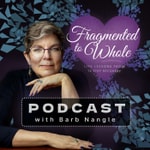Fragmented to Whole: Life Lessons from 12 Step Recovery – Détails, épisodes et analyse
Détails du podcast
Informations techniques et générales issues du flux RSS du podcast.

Fragmented to Whole: Life Lessons from 12 Step Recovery
Barb Nangle
Fréquence : 1 épisode/7j. Total Éps: 302

Tired of feeling fragmented and overwhelmed? Fragmented to Whole: Life Lessons from 12-Step Recovery is your guide to creating a life of wholeness, authenticity, and healthy boundaries. Join Barb Nangle, a boundaries coach and speaker, as she shares raw and honest insights from her own journey and the principles of 12-step recovery. Discover how to set boundaries without guilt or shame, overcome people-pleasing tendencies, manage your emotions effectively, cultivate a stronger sense of self, and build healthier relationships. Barb's approach is raw, honest, and sometimes a little bit (okay, a lot) sweary.
Barb doesn't speak for or endorse any particular 12 step program of recovery. Though she's a huge fan of 12 step recovery, and a member of two 12 step fellowships, she cannot speak for them. If you're ready for real talk and practical tools for transformation, tune in! To learn more about Barb, go to https://higherpowercc.com/
Classements récents
Dernières positions dans les classements Apple Podcasts et Spotify.
Apple Podcasts
🇺🇸 États-Unis - mentalHealth
16/01/2025#72🇺🇸 États-Unis - mentalHealth
12/01/2025#98🇺🇸 États-Unis - mentalHealth
11/01/2025#72🇺🇸 États-Unis - mentalHealth
10/01/2025#63🇺🇸 États-Unis - mentalHealth
09/01/2025#47🇺🇸 États-Unis - mentalHealth
08/01/2025#43🇺🇸 États-Unis - mentalHealth
07/01/2025#71
Spotify
Aucun classement récent disponible
Liens partagés entre épisodes et podcasts
Liens présents dans les descriptions d'épisodes et autres podcasts les utilisant également.
See all- https://calendly.com/
506 partages
- https://trello.com/
495 partages
- https://www.instagram.com/adultchildpod
392 partages
- https://www.instagram.com/higherpowercoaching
180 partages
- https://www.instagram.com/arlinaallen
10 partages
- https://www.patreon.com/higherpowercoaching
424 partages
- https://www.patreon.com/PostSecret
2 partages
Qualité et score du flux RSS
Évaluation technique de la qualité et de la structure du flux RSS.
See allScore global : 68%
Historique des publications
Répartition mensuelle des publications d'épisodes au fil des années.
How Acceptance Changed My Life: Peace, Resilience, and Self-Love | Episode 297
Épisode 297
lundi 30 décembre 2024 • Durée 16:16
Learning how to be accepting of myself and others was one of the most important things I learned in recovery. I have made several episodes on the life-changing impact of this acceptance, and today, I wanted to continue that by sharing the long-term impact of being accepting of the people, places, and circumstances of your life. This week’s episode 297 of the Fragmented to Whole Podcast is about how acceptance changed my life: peace, resilience, and self-love!
In this episode of the Fragmented to Whole Podcast, I’m sharing the profound impact that learning to be accepting has had on my relationships and circumstances in hopes that you, too., can move towards a more accepting, peaceful life.
Be sure to tune in to all the episodes to receive tons of practical tips on living a more whole life and to hear even more about the points outlined above.
Thank you for listening! If you enjoyed this episode, take a screenshot of the episode to post in your stories and tag me! And don’t forget to follow, rate and review the podcast and tell me your key takeaways!
Learn more about Fragmented to Whole at https://higherpowercc.com/podcast/
Are you saying yes when you really want to say no? Are you putting yourself last? Perhaps you're the consummate accommodator whose people-pleasing ways are wearing you out. If so, you're a perfect fit for my 12-week private coaching program!
After Participating in Private Coaching with Barb, You'll...
*Be able to feel peaceful and calm when setting boundaries
*Know how to communicate directly with people
*Your feelings will become more "right-sized"
*Do things because you really want to do them, not because you feel obligated
*Live your life by your own values and feel proud of that
*Learn to keep the focus on yourself and still be kind and helpful
*Come closer to realizing your authentic identity
Sign up for a free 30 minute Better Boundaries call with me at this link. https://calendly.com/barb-nangle/better-boundaries-call
LINKS MENTIONED IN THIS EPISODE:
Ep 2: Acceptance
CONNECT WITH BARB NANGLE:
Subscribe to “Friday Fragments” weekly newsletter
Get a free chapter of my upcoming book: Roadside Recovery
The Ripple Effect of Gratitude- How Small Moments Spark Big Changes | Episode 296
Épisode 296
lundi 23 décembre 2024 • Durée 20:05
The practice of keeping a daily gratitude journal has had such a considerable impact on my life that I now make a gratitude list both morning and night. I’ve found that the benefit of creating this list is that you have to search for things to be grateful for. You almost become wired to look for things to be grateful for in every moment, shifting your perspective to focus on the positives. This week’s episode 296 of the Fragmented to Whole Podcast is about the ripple effect of gratitude- how small moments spark big changes.
Some of the talking points I go over in this episode include:
- Using morning and nightly gratitude journaling as a way to shift my perspective and recognize more good in my life.
- How practicing gratitude has helped me recognize the pivotal moments and people that have shaped the trajectory of my life.
- Two powerful instances where a chain of events led up to something bigger, for which I am incredibly grateful.
Be sure to tune in to all the episodes to receive tons of practical tips on living a more whole life and to hear even more about the points outlined above.
Thank you for listening! If you enjoyed this episode, take a screenshot of the episode to post in your stories and tag me! And don’t forget to follow, rate and review the podcast and tell me your key takeaways!
Learn more about Fragmented to Whole at https://higherpowercc.com/podcast/
Are you saying yes when you really want to say no? Are you putting yourself last? Perhaps you're the consummate accommodator whose people-pleasing ways are wearing you out. If so, you're a perfect fit for my 12-week private coaching program!
After Participating in Private Coaching with Barb, You'll...
*Be able to feel peaceful and calm when setting boundaries
*Know how to communicate directly with people
*Your feelings will become more "right-sized"
*Do things because you really want to do them, not because you feel obligated
*Live your life by your own values and feel proud of that
*Learn to keep the focus on yourself and still be kind and helpful
*Come closer to realizing your authentic identity
Sign up for a free 30 minute Better Boundaries call with me at this link. https://calendly.com/barb-nangle/better-boundaries-call
LINKS MENTIONED IN THIS EPISODE:
Simple Abundance: 365 Days to a Balanced and Joyful Life by Sarah Ban Breathnach
Ep 11: Gratitude
CONNECT WITH BARB NANGLE:
Overgiving No More- Part 1: Recognizing the Four Patterns That Drain You | Episode 287
Épisode 287
lundi 21 octobre 2024 • Durée 20:18
I have always been a giver, but through recovery, I came to terms with the fact that I had been an overgiver. I felt obligated to drop everything and give to everyone at the drop of a hat, which was draining. However, through building healthy boundaries, I learned to give in a healthy way, pouring from the overflow instead of from an empty cup. This week’s episode 287 of the Fragmented to Whole Podcast is part 1 of Overcoming No More: Recognizing the Four Patterns That Drain You!
If you feel like you don’t know how to be in your life, be in your feelings, feel situated within yourself or how to be in relationships or organizations, it’s probably because you’re more focused on others than you are yourself. If this is you, you are a perfect candidate for Boundaries by Design: A Blueprint for Life, an 8-week structured course for women.
This group coaching program will give you the framework, coaching, and guidance to create a manual for your life. You’ll know where you end and others begin, what your responsibility is and what’s not, and what you like, want, need, and prefer.
Some of the talking points I go over in this episode include:
- The difference between someone overgiving and someone just giving.
- Breaking down the 4 common patterns of people who overgive:
- Misplaced outer focus.
- Excessive independence.
- Self-imposed limitations.
- Ineffective communication.
- Examples of how each of these patterns might show up in your life.
- How building healthy boundaries helps you keep the focus on yourself and avoid overgiving.
Stay tuned for next week as I share how boundaries restore balance and energize your life.
Be sure to tune in to all the episodes to receive tons of practical tips on living a more whole life and to hear even more about the points outlined above.
Thank you for listening! If you enjoyed this episode, take a screenshot of the episode to post in your stories and tag me! And don’t forget to follow, rate and review the podcast and tell me your key takeaways!
Learn more about Fragmented to Whole at https://higherpowercc.com/podcast/
LINKS MENTIONED IN THIS EPISODE:
Ep 3: Victim Mentality
Ep 10: My Tools of Recovery Part III: Focus On Me
CONNECT WITH BARB NANGLE:
Subscribe to “Friday Fragments” weekly newsletter
Get a free chapter of my upcoming book: Roadside Recovery
How to Change Your Behavior After 50 Years of Momentum in the Other Direction | Episode 198
Épisode 198
lundi 6 février 2023 • Durée 23:10
Recently, I was talking with a friend and reflecting on how I managed to change some of my long-standing patterns of behavior and the methods for how that change process unfolds. This week’s episode 198 of the Fragmented to Whole Podcast is about how to change your behavior after 50 years in the other direction!
Support the show by becoming a Patreon member!
In this episode of the Fragmented to Whole Podcast, I’m sharing some of the big ways I have changed my life over the years and how learning to pause became the framework for every other tool I got from recovery. The framework I share for changing your behavior includes:
- You have to believe theoretically that change is possible for humans and if you don’t think it just yet, seek out people who have already done what you're looking to do and use them as inspiration.
- Start to entertain the idea that changing this behavior is something you can do.
- Think through situations you’ve been in where if you would have done the new behavior, things would have turned out differently.
- Continue to be committed to the behavior change.
Understanding that you can stop and change directions is one of the secrets to living a life of contentment. You can learn how to stop doing the things that are not serving you, that are draining you, that are making you feel ashamed, unhappy, or unfulfilled. Be sure to tune in to all the episodes to receive tons of practical tips on living a more whole life and to hear even more about the points outlined above.
Thank you for listening! If you enjoyed this episode, take a screenshot of the episode to post in your stories and tag me! And don’t forget to follow, rate and review the podcast and tell me your key takeaways!
LINKS MENTIONED IN THIS EPISODE:
Ep. 8 My tools of recovery series Part I: Pausing
CONNECT WITH BARB NANGLE:
Subscribe to “Friday Fragments” weekly newsletter
“6 Weeks to Better Boundaries with Barb” online course BetterBoundarieswithBarb.com
Delayed Gratification- The Antidote to "I Want What I Want When I Want It" | Episode 197
Épisode 197
lundi 30 janvier 2023 • Durée 16:00
Looking back, I can see I had this ‘I want what I want when I want it’ mentality in many areas of my life. But now that I’m in recovery and emotionally mature, I’m able to see that it had a lot to do with immaturity. I’m now able to delay my gratification and make life so much easier for myself rather than harder. This week’s episode 197 of the Fragmented to Whole Podcast is about delayed gratification- the antidote to “I want what I want when I want it.”
Support the show by becoming a Patreon member!
In this episode of the Fragmented to Whole Podcast, I’m sharing a story of the time I overlooked some major red flags and rented a camper van anyway because I wanted to fulfill my plan to go on a 6-week solo road trip. After many calls to mechanics and finally ditching the van, I learned a very valuable lesson about making my life easier by taking time and thinking critically.
The secret here is delaying gratification long enough to look at the truth of things. Stop ignoring red flags and ask for help if you don’t trust your own judgment. At the end of the day, just because you want something doesn’t mean you should have it.
Be sure to tune in to all the episodes to receive tons of practical tips on living a more whole life and to hear even more about the points outlined above.
Thank you for listening! If you enjoyed this episode, take a screenshot of the episode to post in your stories and tag me! And don’t forget to follow, rate and review the podcast and tell me your key takeaways!
CONNECT WITH BARB NANGLE:
Subscribe to “Friday Fragments” weekly newsletter
“6 Weeks to Better Boundaries with Barb” online course BetterBoundarieswithBarb.com
Denial 4.0 | Episode 196
Épisode 196
lundi 23 janvier 2023 • Durée 23:30
A few months ago I recorded an episode called “Denial 3.0” and said that I had no doubt that in the years to come, I will be recording even more episodes about me coming out of denial as this is a lifelong journey. Who knew that it wouldn't be in the years to come but actually sooner in the months to come? This week’s episode 196 of the Fragmented to Whole Podcast is more instances of me coming out of denial!
Support the show by becoming a Patreon member!
I often share on the Fragmented to Whole Podcast my own experiences of coming out of denial to illustrate to you what this looks like and to help myself come further out of denial by bringing this stuff out into the open. This week, I’m sharing a couple of examples that have happened in my life recently where others have shed light on my part in things and helped me realize I was doing things I didn’t even realize I was doing.
I also cover in this episode:
- The power of acknowledging and thanking someone for helping you come out of denial and apologizing for your actions, no matter how much time has passed.
- The ways in which I have been helpful in order to be controlling without even realizing it.
- Prioritizing impact over intent.
I want to thank all of the people who are helping me come out of denial and who will come to help me in the future. My hope for you is that hearing my experiences will help you come out of your own denial and if they already have, I would love to hear from you.
Be sure to tune in to all the episodes to receive tons of practical tips on living a more whole life and to hear even more about the points outlined above.
Thank you for listening! If you enjoyed this episode, take a screenshot of the episode to post in your stories and tag me! And don’t forget to follow, rate and review the podcast and tell me your key takeaways!
LINKS MENTIONED IN THIS EPISODE:
Ep. 99: How to Actually Understand the Difference Between Intention and Impact
Ep. 1: My Story in Brief
CONNECT WITH BARB NANGLE:
Subscribe to “Friday Fragments” weekly newsletter
“6 Weeks to Better Boundaries with Barb” online course BetterBoundarieswithBarb.com
Your Step-by-Step Guide For How to Mindfully Rekindle Old Friendships | Episode 195
Épisode 195
lundi 16 janvier 2023 • Durée 14:49
I recently talked to a friend from recovery who asked me if I had any advice or experience when it comes to rekindling an old friendship and of course I do so I wanted to share the advice I gave to her with you as well. This week’s episode 195 of the Fragmented to Whole Podcast is your step-by-step guide for how to mindfully rekindle old friendships!
Support the show by becoming a Patreon member!
In this episode of the Fragmented to Whole Podcast, I’m sharing the advice I gave to my friend for how to rekindle an old friendship and some example language to use if you’re just not sure where to start.
I do what to make a disclaimer that in this scenario, my friend was the one who asked her friend for some space so this may look a bit different if it played out the other way around for you.
The basic steps I have laid out for you to use if you’re planning to rekindle a friendship are:
- Keep the focus on yourself, not the other person.
- Think about why you disconnected from the other person.
- Think about why you want to rekindle this relationship.
- Know why now of all times you want to do this.
- Ask yourself if you clearly communicated your issues with the person at the time.
- Ask yourself if you requested they take specific actions at the time.
- Get clear on what you’d need from the other person in order to stay in the relationship with them.
I’d love to hear your feedback on what came up for you regarding your own relationships after listening to this episode. Especially if you’re someone like me who has changed and continue to change in recovery, I’d love to hear the things you’ve decided to say when you’re trying to rekindle old friendships or renegotiate the terms of your existing friendships. Be sure to tune in to all the episodes to receive tons of practical tips on living a more whole life and to hear even more about the points outlined above.
Thank you for listening! If you enjoyed this episode, take a screenshot of the episode to post in your stories and tag me! And don’t forget to follow, rate and review the podcast and tell me your key takeaways!
CONNECT WITH BARB NANGLE:
Subscribe to “Friday Fragments” weekly newsletter
“6 Weeks to Better Boundaries with Barb” online course BetterBoundarieswithBarb.com
How to Know if You're an Adult Child- Part 2: The Other Laundry List | Episode 194
Épisode 194
lundi 9 janvier 2023 • Durée 17:54
Although ACA started as Adult Children of Alcoholics, it is now referred to as Adult Children of Alcoholics and Dysfunctional Families because whether your parents were addicts, alcoholics, chronically ill, mentally ill, militaristic, super religious, etc. any kind of family dysfunction can lead to the same set of traits. This week’s episode 194 of the Fragmented to Whole Podcast is part 2 of how to know if you’re an adult child- The Other Laundry List!
Support the show by becoming a Patreon member!
Last week I shared what is referred to by the ACA fellowship as The Laundry List- the 14 traits of an adult child to describe the traits we as “adult children” take on as a result of our dysfunctional families. While the original laundry list describes how we are affected by alcoholism and family dysfunction, it does not mention how we might “act out” those traits by becoming victimizers and adopting the behaviors of our parents, and thus, the seed for The Other Laundry List was planted.
The 14 traits on The Other Laundry List include:
- To cover our fear of people and our dread of isolation we tragically become the very authority figures who frighten others and cause them to withdraw.
- To avoid becoming enmeshed and entangled with other people and losing ourselves in the process, we become rigidly self-sufficient. We disdain the approval of others.
- We frighten people with our anger and threat of belittling criticism.
- We dominate others and abandon them before they can abandon us or we avoid relationships with dependent people altogether. To avoid being hurt, we isolate and dissociate and thereby abandon ourselves.
- We live life from the standpoint of a victimizer, and are attracted to people we can manipulate and control in our important relationships.
- We are irresponsible and self-centered. Our inflated sense of self-worth and self-importance prevents us from seeing our deficiencies and shortcomings.
- We make others feel guilty when they attempt to assert themselves.
- We inhibit our fear by staying deadened and numb.
- We hate people who “play” the victim and beg to be rescued.
- We deny that we’ve been hurt and are suppressing our emotions by the dramatic expression of “pseudo” feelings.
- To protect ourselves from self-punishment for failing to “save” the family we project our self-hate onto others and punish them instead.
- We “manage” the massive amount of deprivation we feel, coming from abandonment within the home, by quickly letting go of relationships that threaten our “independence” (not too close).
- We refuse to admit we’ve been affected by family dysfunction or that there was dysfunction in the home or that we have internalized any of the family’s destructive attitudes and behaviors.
- We act as if we are nothing like the dependent people who raised us.
Both parts of The Laundry List come together to fill the gaps and describe the traits that adult children of alcoholics and dysfunctional families often carry with them.
LINKS MENTIONED IN THIS EPISODE:
CONNECT WITH BARB NANGLE:
How to Know if You're an Adult Child- Part 1: The Laundry List | Episode 193
Épisode 193
lundi 2 janvier 2023 • Durée 16:50
A huge part of my recovery has been coming out of denial and part of my denial journey is coming to realize that I am what’s called an Adult Child and then, once I realized that - that more traits of an adult child apply to me than I once believed. This week’s episode 193 of the Fragmented to Whole Podcast is part 1 of how to know if you’re an adult child- The Laundry List!
Support the show by becoming a Patreon member!
In this episode of the Fragmented to Whole Podcast, I’m reading what is affectionately called The Laundry List- the 14 traits of an adult child and sharing my experience of coming to realize how these traits apply to me- whether they were obvious to me at first or not.
The 14 traits on The Laundry List include:
- We became isolated and afraid of people and authority figures.
- We became approval seekers and lost our identity in the process.
- We are frightened by angry people and any personal criticism.
- We either become alcoholics, marry them, or both, or find another compulsive personality such as a workaholic to fulfill our sick abandonment needs.
- We live life from the viewpoint of victims and we are attracted by that weakness in our love and friendship relationships.
- We have an overdeveloped sense of responsibility and it is easier for us to be concerned with others rather than ourselves; this enables us not to look too closely at our own faults, etc.
- We get guilty feelings when we stand up for ourselves instead of giving in to others.
- We became addicted to excitement.
- We confuse love and pity and tend to “love” people we can “pity” and “rescue.”
- We have “stuffed” our feelings from our traumatic childhoods and have lost the ability to feel or express our feelings because it hurts so much (Denial).
- We judge ourselves harshly and have a very low sense of self-esteem.
- We are dependent personalities who are terrified of abandonment and will do anything to hold on to a relationship in order not to experience painful abandonment feelings, which we received from living with sick people who were never there emotionally for us.
- Alcoholism is a family disease, and we became para-alcoholics and took on the characteristics of that disease even though we did not pick up the drink.
- Para-alcoholics are reactors rather than actors.
These are the survival traits we adapted to represent our “false self” and protect ourselves as a result of growing up in a dysfunctional family. If these don’t resonate with you, stay tuned for part 2 where I cover The Other Laundry List.
Thank you for listening! If you enjoyed this episode, take a screenshot of the episode to post in your stories and tag me! And don’t forget to follow, rate and review the podcast and tell me your key takeaways!
LINKS MENTIONED IN THIS EPISODE:
CONNECT WITH BARB NANGLE:
Subscribe to “Friday Fragments” weekly newsletter
“6 Weeks to Better Boundaries with Barb” online course BetterBoundarieswithBarb.com
My CEO Retreat Failed, But I Still Had a Great Day Thanks to Recovery | Episode 192
Épisode 192
lundi 26 décembre 2022 • Durée 22:25
Earlier this month, I set aside one day where I planned to take myself on a CEO retreat and do a deep dive into a project for my business. When the day came, it was an absolute fail, and yet, my life wasn’t ruined because of it. This week’s episode 192 of the Fragmented to Whole Podcast is about the time my CEO retreat failed but I still had a great day thanks to recovery!
Support the show by becoming a Patreon member!
In this episode of the Fragmented to Whole Podcast, I’m walking you through a day in my life where it felt like everything that could have gone wrong, did and sharing how recovery changed how I faced these challenges that would have otherwise ruined my day.
This story is a perfect example that going through recovery doesn’t mean shit just stops happening to you. Shit still happens to me all of the time. But through recovery, I have changed how I approach and react to these situations so that I can still live a peaceful life. Be sure to tune in to all the episodes to receive tons of practical tips on living a more whole life and to hear even more about the points outlined above.
Thank you for listening! If you enjoyed this episode, take a screenshot of the episode to post in your stories and tag me! And don’t forget to follow, rate and review the podcast and tell me your key takeaways!
LINKS MENTIONED IN THIS EPISODE:
Ep. 2 Acceptance
Ep. 31 Overcoming unrealistic expectations
Ep. 153 Learning to Have Realistic Expectations and Becoming Able to Let Things Go
CONNECT WITH BARB NANGLE:
Subscribe to “Friday Fragments” weekly newsletter
“6 Weeks to Better Boundaries with Barb” online course BetterBoundarieswithBarb.com









